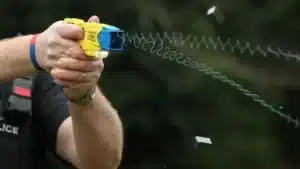Portugal’s police officers had long been waiting for the opportunity when they could publicly vent their frustrations over unsatisfactory working conditions, salary and subsidy cuts and career progression issues. The opportunity arose last week as thousands of officers took to the streets of Lisbon to call for the government’s resignation.
The protest was described as a “historic moment” for Portugal.
The shooting dead of a GNR officer last weekend during an operation in a restaurant at Pinhal Novo, near Setúbal ,has renewed calls for more officers to be drafted into GNR ranks.
The incident occurred on Saturday, November 23, just three days after a major demonstration outside the Assembleia da República parliament building in Lisbon, where thousands of off-duty police officers had gathered to protest against the government’s proposals to slash their pay and pension benefits.
GNR officers were called to the O Refúgio restaurant after receiving reports that a man, of Moldavian nationality, had barricaded himself inside the premises after taking a number of people hostage.
Bruno Chainho, a 27-year-old GNR officer stationed in Pinhal Novo but originally from Santiago de Cacém in the Alentejo, was one of the first to approach the building but was shot in the face as he confronted the suspect and held hostage along with the others. After a standoff lasting more than six hours, the order was given to end the siege.
In the ensuing gun battle six other individuals were wounded, including a further four GNR personnel, before the gunman was shot dead.
The tragedy prompted José Alho, the President of the Associação Sócio-Profissional Independente da Guarda (ASPIG), to draw attention to the fact that the GNR currently has a shortfall of 5,000 personnel, a fact he claimed hindered effective policing and endangered the safety of those on patrol.
“Those on patrol, the first responders, are in constant danger of being killed,” he told Diário de Notícias newspaper shortly after offering condolences to the slain officer’s family.
“Police operational ability is always compromised when public policy is changed with no regard for support infrastructure,” he said citing an example whereby it’s common to have only two GNR officers on duty to patrol remote, inland municipalities. Needless bureaucracy and officialdom is also hindering the ability of police officers to carry out their duties effectively.
The ASPIG president also levelled criticism at those who insist on cutting National Republican Guard numbers. “The operational framework requires 28,000 officers,” he said. “But the reality is that at present the GNR has only 23,000 personnel.”
The shooting in Pinhal Novo has cast an even longer shadow over the events of Thursday November 21, when a huge demonstration by off-duty police officers on the steps of Parliament led to the Minister for Internal Affairs, Miguel Macedo, condemning the act as an “invasion” and assuring the public that it was an “exceptional event and would not be repeated”.
Speaking during a press conference in the wake of the demonstration he said: “In law, there are rules that must be observed and limits that cannot be exceeded. Security officers are the first to recognise this fact. What happened was therefore exceptional and it will not happen again.”
What was, in effect, a damage limitation exercise, Macedo continued: “It is essential that the police not only defend the rule of law, but defend the image and credibility of officers and the security forces.
“The Portuguese people must be able to trust the PSP (Polícia de Segurança Pública) and the security forces as a whole. They are all subject to the rules of democratic law,” he added.
The incident led to the resignation of PSP National Director Paulo Valente Gomes, one of Portugal’s most senior policemen. His successor is 47-year-old Luís Farinha, formerly the commander of the Unidade Especial de Polícia (Special Police Unit) – ironically the same unit on duty during last week’s disturbances.
Earlier in the week Miguel Macedo had remarked that police could not be exempt from the sacrifices suffered by the rest of Portuguese society in order to meet the demands of its international creditors. His comments angered police associations who are demanding that their members be spared from pay and pension cuts introduced in return for a €78 billion international bailout granted to Portugal in 2011.
The demonstration – the largest of its kind ever witnessed in Portugal – began late afternoon in Praça Luís de Camões in Lisbon’s Chiado district before moving on to the Assembleia da República parliament building in São Bento.
Thousands of members of the national security forces unions and professional associations, made up of elements from the PSP, Guarda Nacional Republicana (GNR), border control agency Serviço de Estrangeiros e Fronteiras (SEF), food safety and economic monitoring authority Autoridade de Segurança Alimentar e Económica (ASAE), the Polícia Judiciária (PJ) and the Polícia Municipal (PM), gathered to protest about ongoing pay and pension cuts and further austerity measures that the Portuguese government plan to introduce in the 2014 budget.
Tension grew as demonstrator numbers swelled and the vocal throng, chanting anti-government slogans, began to move forward towards a police cordon. Protestors eventually overturned security barriers set up by on-duty PSP riot officers on steps leading up to the building and reached the main door.
After demanding the resignation of the government of Prime Minister Pedro Passos Coelho and singing the national anthem, they dispersed with a collective applause, with some even shaking hands with their on-duty colleagues.
Reacting to the incident, which has received national and international press coverage, Paulo Rodrigues, the president of the police union Associação Sindical dos Profissionais da Polícia, believed the “invasion” of the parliament steps was a symbolic gesture although he conceded it was a “thoughtless” manoeuvre on the part of the protestors. However, the union chief is in no doubt that had the on-duty police tried to prevent their colleagues from reaching the top of the stairs there would have been violent confrontation, he told Expresso newspaper.
Regarding Miguel Macedo’s response to the protest, Rodrigues had hoped for a more contrite retort. “We were expecting a much clearer message from the Ministry of Internal Affairs, an answer that would meet the demands of the demonstrators.”
He was also puzzled by the resignation of Superintendent Paulo Valente Gomes.
“Policing the demonstration was not the sole responsibility of the PSP National Director,” he said, reiterating that the decision to allow the off-duty officers to ascend the Parliament steps was made in the interests of safety and to avoid a potential clash with the on-duty riot police. To that end, he expressed full confidence in the new PSP chief Luís Farinha who was in charge on the night.
Pedro Passos Coelho, meanwhile, stood by comments made by the Minister for Internal Affairs.
“What happened is not a good indicator of the authority of the police,” the Prime Minister told reporters during an official visit to the Algarve. “The protest should not have been overshadowed by the fact that members of the security forces broke the law.”
|| History repeating itself
Last week’s demonstration on the steps of the Parliament building that pitted on-duty police officers with their protesting off-duty colleagues inevitably drew comparisons with the infamous confrontation between members of the security forces in Lisbon’s Praça do Comércio nearly 25 years ago.
On April 21 1989 around 400 disgruntled Polícia de Segurança Pública (PSP) officers, most in uniform, rallied in the city centre to demand better pay and working conditions and greater transparency in the disciplinary justice system.
Legislation in place at the time meant the protest was illegal and on-duty PSP riot police, including dog-handlers, were called in to disperse the demonstrators. The protestors, however, stood their ground and eventually a water cannon was deployed followed by baton charges to break up the rally. Six off-duty policemen were arrested during the skirmishes in what became known as the ‘secos e molhados’ – the wet and dry protest.


















